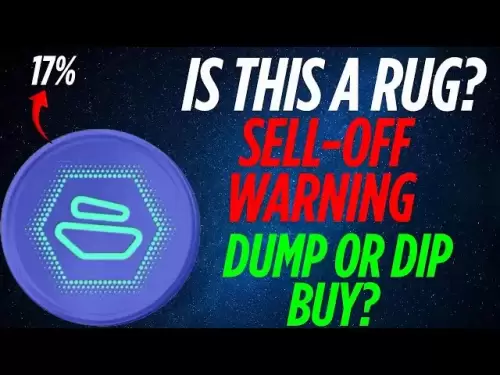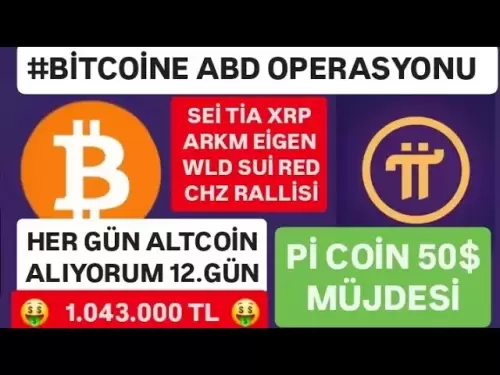-
 Bitcoin
Bitcoin $108,708.8110
0.60% -
 Ethereum
Ethereum $2,561.6057
1.91% -
 Tether USDt
Tether USDt $1.0001
-0.03% -
 XRP
XRP $2.2795
0.57% -
 BNB
BNB $662.2393
1.00% -
 Solana
Solana $153.1346
3.74% -
 USDC
USDC $1.0000
0.00% -
 TRON
TRON $0.2877
0.97% -
 Dogecoin
Dogecoin $0.1710
3.93% -
 Cardano
Cardano $0.5871
1.61% -
 Hyperliquid
Hyperliquid $39.6663
1.68% -
 Sui
Sui $2.9032
0.79% -
 Bitcoin Cash
Bitcoin Cash $496.1879
1.71% -
 Chainlink
Chainlink $13.5807
3.01% -
 UNUS SED LEO
UNUS SED LEO $9.0777
0.61% -
 Stellar
Stellar $0.2514
4.51% -
 Avalanche
Avalanche $18.1761
1.86% -
 Shiba Inu
Shiba Inu $0.0...01173
1.72% -
 Toncoin
Toncoin $2.8010
-4.23% -
 Hedera
Hedera $0.1594
3.21% -
 Litecoin
Litecoin $87.0257
-0.53% -
 Monero
Monero $319.1217
1.79% -
 Polkadot
Polkadot $3.3853
0.68% -
 Dai
Dai $0.9999
-0.01% -
 Ethena USDe
Ethena USDe $1.0003
0.02% -
 Bitget Token
Bitget Token $4.3420
-0.97% -
 Uniswap
Uniswap $7.3772
1.39% -
 Aave
Aave $286.6277
5.61% -
 Pepe
Pepe $0.0...09994
2.33% -
 Pi
Pi $0.4589
1.76%
How long does Bitstamp's KYC audit usually take?
Bitstamp's KYC audit typically takes 2-5 business days, but can vary based on document completeness, application volume, and verification complexity.
Apr 24, 2025 at 09:43 am
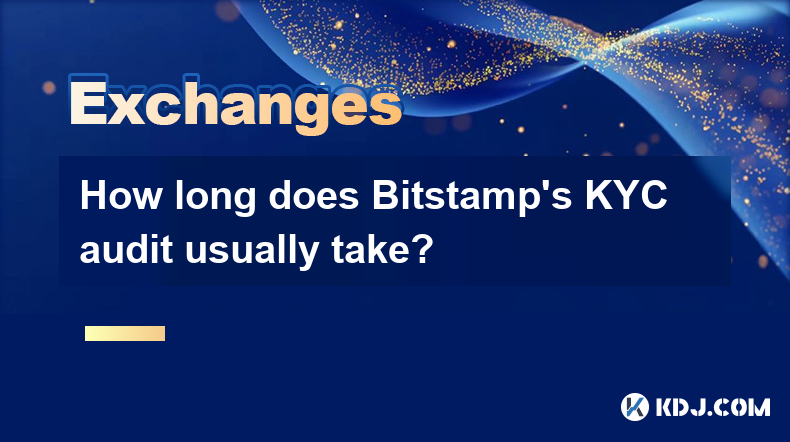
How long does Bitstamp's KYC audit usually take?
When you decide to join a cryptocurrency exchange like Bitstamp, one of the initial steps you'll encounter is the Know Your Customer (KYC) audit. This process is crucial for ensuring the security and compliance of the platform, but many users are curious about how long it might take. The duration of Bitstamp's KYC audit can vary based on several factors, which we will explore in detail.
Factors Influencing the KYC Audit Duration
Several elements can affect how long Bitstamp's KYC audit takes. Understanding these factors can help set realistic expectations and streamline the process.
Completeness of Submitted Documents: If all required documents are submitted correctly and completely, the audit can proceed more quickly. Incomplete or incorrect submissions can lead to delays as the verification team may need to request additional information.
Volume of Applications: The number of KYC applications being processed at any given time can impact the duration. During peak times, such as after a major cryptocurrency event or market surge, the verification team may be busier, leading to longer wait times.
Complexity of the Verification: Some accounts may require more thorough verification due to the nature of the user's identity or the amount of funds they intend to deposit or withdraw. Higher scrutiny can extend the audit period.
Technical Issues: Occasionally, technical issues on Bitstamp's end can cause delays. These are usually resolved quickly, but they can still impact the overall timeline.
Typical Timeframe for Bitstamp's KYC Audit
Based on user experiences and Bitstamp's own guidelines, the typical timeframe for the KYC audit ranges from 2 to 5 business days. However, this can vary significantly.
Standard Verification: For most users, the process takes around 2 to 3 business days. This assumes that all documents are submitted correctly and there are no issues with the verification process.
Enhanced Verification: If additional checks are required, the process can take up to 5 business days. This is more common for users who are depositing or withdrawing larger amounts of cryptocurrency.
Steps to Expedite the KYC Audit Process
If you want to ensure that your KYC audit with Bitstamp goes as smoothly and quickly as possible, consider the following steps:
Prepare All Documents in Advance: Before starting the KYC process, gather all necessary documents. These typically include a government-issued ID, proof of address, and sometimes a selfie with the ID.
Ensure Document Clarity: Make sure all documents are clear and legible. Blurry or poorly lit images can lead to delays as the verification team may need to request resubmissions.
Follow Instructions Carefully: Bitstamp provides detailed instructions on how to submit your documents. Following these instructions to the letter can help avoid unnecessary back-and-forth.
Monitor Your Email: Keep an eye on your email for any requests for additional information from Bitstamp. Responding promptly can help keep the process moving forward.
Common Issues and How to Resolve Them
Even with the best preparation, issues can arise during the KYC audit. Here are some common problems and how to address them:
Incomplete Documentation: If you receive a notification that your documentation is incomplete, review the requirements and resubmit any missing documents as soon as possible.
Document Rejection: If a document is rejected, carefully read the reason provided by Bitstamp. It could be due to poor quality, incorrect type, or expiration. Resubmit the correct document promptly.
Verification Delays: If you notice that the process is taking longer than expected, you can reach out to Bitstamp's customer support for an update. They can provide insight into any delays and help expedite the process if possible.
What to Do While Waiting for KYC Approval
While waiting for your KYC audit to be completed, there are several things you can do to prepare for trading on Bitstamp:
Familiarize Yourself with the Platform: Take the time to explore Bitstamp's interface, understand the trading options, and read up on any fees or limits that may apply.
Set Up Security Measures: Enable two-factor authentication (2FA) and other security features to protect your account once it's verified.
Plan Your Trading Strategy: Consider what cryptocurrencies you want to trade and develop a strategy. This can help you hit the ground running once your account is approved.
Frequently Asked Questions
Q: Can I speed up the KYC process by paying a fee?
A: Bitstamp does not offer a paid expedited service for KYC audits. The best way to speed up the process is to ensure all documents are submitted correctly and promptly respond to any requests for additional information.
Q: What happens if my KYC audit is rejected?
A: If your KYC audit is rejected, Bitstamp will provide a reason for the rejection. You can address the issue and resubmit your documents. If you believe the rejection was in error, you can contact customer support for further assistance.
Q: Is there a way to check the status of my KYC audit?
A: Bitstamp typically sends email updates regarding the status of your KYC audit. You can also log into your account and check the verification section for any updates or pending actions.
Q: Can I start trading before my KYC audit is complete?
A: No, you cannot start trading on Bitstamp until your KYC audit is complete and your account is fully verified. This is a security measure to ensure compliance with regulatory requirements.
Disclaimer:info@kdj.com
The information provided is not trading advice. kdj.com does not assume any responsibility for any investments made based on the information provided in this article. Cryptocurrencies are highly volatile and it is highly recommended that you invest with caution after thorough research!
If you believe that the content used on this website infringes your copyright, please contact us immediately (info@kdj.com) and we will delete it promptly.
- Ripple, XRP, and AI Tokens: Is Ruvi AI the Next Big Thing?
- 2025-07-08 05:30:12
- Crypto Investment: BlockDAG, Litecoin, and the Solana Meme Coin Mania
- 2025-07-08 06:10:12
- Altcoins in Focus: BlockDAG, Litecoin, and the Shifting Crypto Landscape
- 2025-07-08 05:35:12
- BNB's Bullish Breakout: Riding the $600 Support Level Wave
- 2025-07-08 04:55:13
- Solana ETF on Hold: SEC Delay and Crypto Regulation Scrutiny
- 2025-07-08 06:10:12
- Altcoin, Date, Price: Navigating the Crypto Bill & Meme Coin Mania
- 2025-07-08 06:15:12
Related knowledge
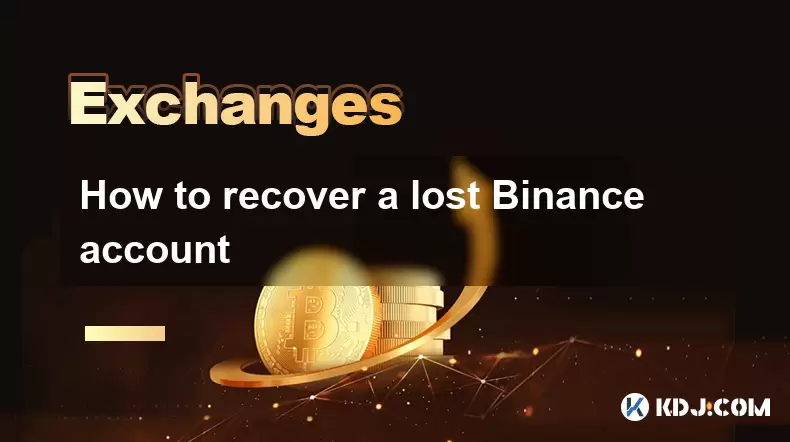
How to recover a lost Binance account
Jul 07,2025 at 09:07pm
What Happens When a Binance Account Is Lost?Losing access to your Binance account can be a distressing experience, especially if you hold significant digital assets. This typically occurs due to forgotten login credentials, loss of two-factor authentication (2FA) devices, or compromised accounts. Understanding the exact reason behind losing access is cr...
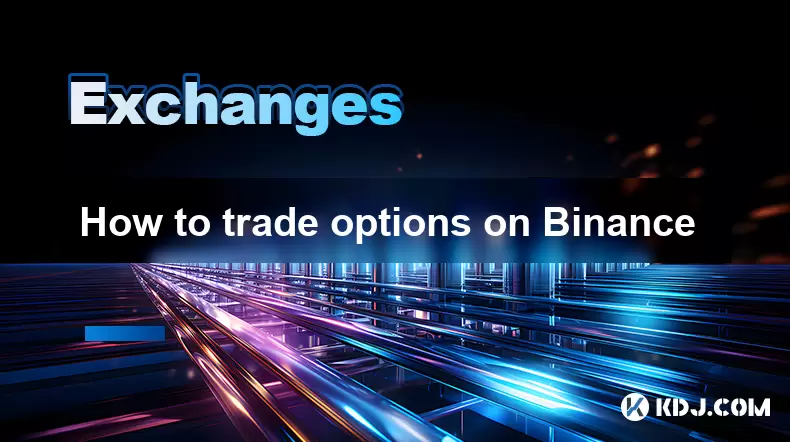
How to trade options on Binance
Jul 08,2025 at 04:35am
Understanding Options Trading on BinanceOptions trading allows investors to speculate on the future price of an asset without owning it. On Binance, users can trade crypto options, which are derivative contracts that give traders the right—but not the obligation—to buy or sell a cryptocurrency at a predetermined price before a specific date. This form o...
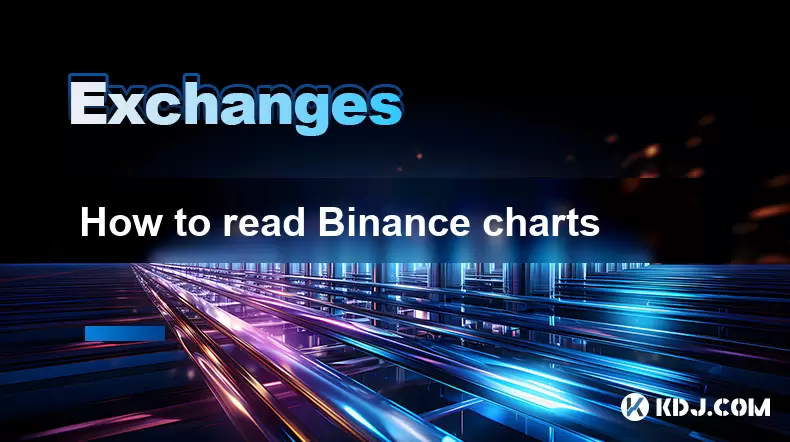
How to read Binance charts
Jul 07,2025 at 08:14pm
Understanding the Basics of Binance ChartsReading Binance charts effectively is essential for making informed trading decisions in the cryptocurrency market. Before diving into technical indicators and candlestick patterns, it's important to understand the basic layout of a chart on the Binance platform. The default chart interface displays price moveme...
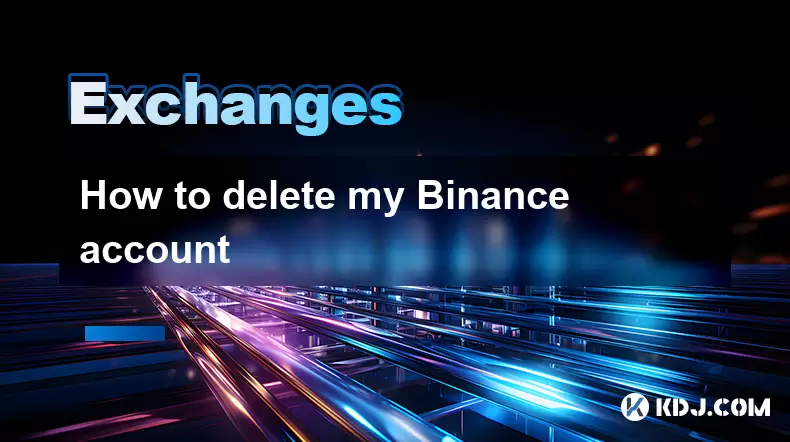
How to delete my Binance account
Jul 08,2025 at 06:35am
How to Delete My Binance AccountIf you're considering deleting your Binance account, it's important to understand the process thoroughly. Binance is one of the largest cryptocurrency exchanges globally, and permanently closing your account involves several steps. This guide will walk you through each necessary action to ensure a smooth deletion. Prepari...
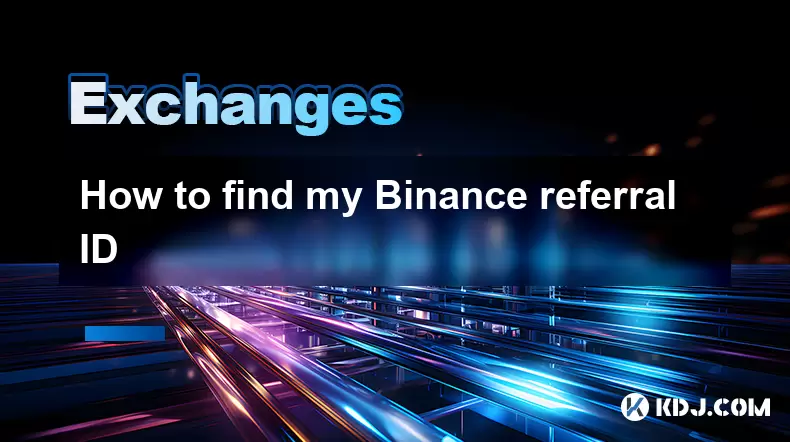
How to find my Binance referral ID
Jul 07,2025 at 06:29pm
What is a Binance Referral ID?A Binance Referral ID is a unique identifier assigned to each user on the Binance platform. This ID allows users to refer new traders to Binance and earn commissions from their trading fees. The referral program is an integral part of Binance’s ecosystem, encouraging community growth and rewarding active participants. Every...
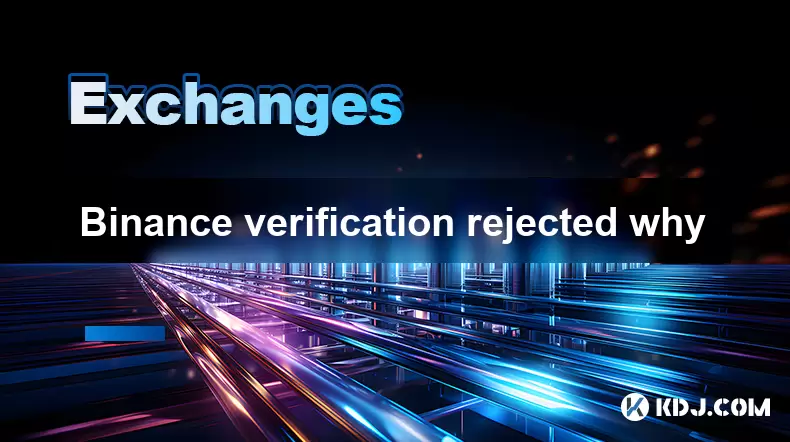
Binance verification rejected why
Jul 07,2025 at 06:57pm
Understanding Binance Verification RejectionIf your Binance verification was rejected, you're likely searching for answers on why this happened and how to resolve it. Binance, as one of the world's largest cryptocurrency exchanges, requires users to complete identity verification to comply with Know Your Customer (KYC) regulations. When a verification r...

How to recover a lost Binance account
Jul 07,2025 at 09:07pm
What Happens When a Binance Account Is Lost?Losing access to your Binance account can be a distressing experience, especially if you hold significant digital assets. This typically occurs due to forgotten login credentials, loss of two-factor authentication (2FA) devices, or compromised accounts. Understanding the exact reason behind losing access is cr...

How to trade options on Binance
Jul 08,2025 at 04:35am
Understanding Options Trading on BinanceOptions trading allows investors to speculate on the future price of an asset without owning it. On Binance, users can trade crypto options, which are derivative contracts that give traders the right—but not the obligation—to buy or sell a cryptocurrency at a predetermined price before a specific date. This form o...

How to read Binance charts
Jul 07,2025 at 08:14pm
Understanding the Basics of Binance ChartsReading Binance charts effectively is essential for making informed trading decisions in the cryptocurrency market. Before diving into technical indicators and candlestick patterns, it's important to understand the basic layout of a chart on the Binance platform. The default chart interface displays price moveme...

How to delete my Binance account
Jul 08,2025 at 06:35am
How to Delete My Binance AccountIf you're considering deleting your Binance account, it's important to understand the process thoroughly. Binance is one of the largest cryptocurrency exchanges globally, and permanently closing your account involves several steps. This guide will walk you through each necessary action to ensure a smooth deletion. Prepari...

How to find my Binance referral ID
Jul 07,2025 at 06:29pm
What is a Binance Referral ID?A Binance Referral ID is a unique identifier assigned to each user on the Binance platform. This ID allows users to refer new traders to Binance and earn commissions from their trading fees. The referral program is an integral part of Binance’s ecosystem, encouraging community growth and rewarding active participants. Every...

Binance verification rejected why
Jul 07,2025 at 06:57pm
Understanding Binance Verification RejectionIf your Binance verification was rejected, you're likely searching for answers on why this happened and how to resolve it. Binance, as one of the world's largest cryptocurrency exchanges, requires users to complete identity verification to comply with Know Your Customer (KYC) regulations. When a verification r...
See all articles

























